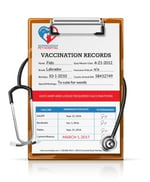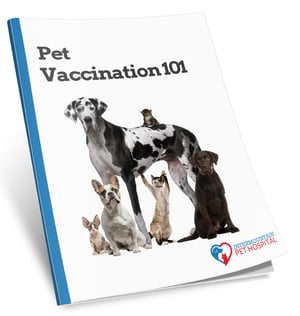As a responsible pet parent, you want the very best for your fur baby, including the best quality of life. And just like we humans need to follow the recommended vaccinations of our doctors, following your vet’s recommended vaccination schedule is one of the best ways for your pet to have a healthy life style.
Admittedly, there is so much information on the internet that, it’s hard to tell what is fact, fiction, or a bit of both.
While every dog and cat’s vaccination needs will vary due to breed, lifestyle and geographic location, we’ve provided a break down for what the veterinarians at IPH suggest for pets living in Idaho.

No matter the breed or location, every pet is required by law to be vaccinated for rabies. Every state in the U.S. has made it mandatory for every pet to get the rabies vaccinations. Even pets that are kept inside can be exposed if they somehow get out of the house or worse, an uninvited animal (like a bat) gets in the house, (queue scream and an extreme case of the heebie-jeebies).
Rabies is still very much an issue in Idaho, and specifically, the Treasure Valley. 11 cases in Ada County were reported in 2016 alone. Not vaccinating isn’t worth the risk since rabies is 100% fatal to pets and humans if medical attention is not given right after infection.
Dogs and cats get two rabies shots their first year of life, and then one booster shot every three years. Most veterinary clinics will send you reminders when your pet is due for a booster shot.
 DA2PP (+L4): This vaccine protects against distemper, canine adenovirus type 1 and 2, canine parvovirus, and parainfluenza. The +L4 is added after the first DA2PP vaccination and protects against Leptospira serovars, a disease that can cause infection and worst-case-scenario, multiple organ failures.
DA2PP (+L4): This vaccine protects against distemper, canine adenovirus type 1 and 2, canine parvovirus, and parainfluenza. The +L4 is added after the first DA2PP vaccination and protects against Leptospira serovars, a disease that can cause infection and worst-case-scenario, multiple organ failures.
Bordetella: This vaccination protects against the bacteria that causes respiratory infection, commonly known as kennel cough. We require this vaccination if your dog attends the lodge, grooming, or doggie day camp.
Crotalus Atros (Rattle Snake vaccine): This vaccine is for high risk breeds or lifestyles (hunters, hikers, etc). Two boosters 2 - 4 weeks apart are needed for initial immunity. It is then boosted annually. Puppies may receive this vaccine at 12 and 16 weeks of age. However, it is recommended to split and give a week later than other vaccines to prevent too many injections all at once.
Canine Influenza: (H3N8 and H3N2 strains) Canine Influenza is a relatively new virus compared to the others. H3N2 was first reported in 2004 while H3N8 was identified in 2015. Both strains of the flu have been reported in Idaho.
Intermountain Pet Hospital does require canine flu vaccinations for all dogs staying at our Lodge and Day Camp. Our main reason for requiring the vaccine is that dogs at IPH can run a greater risk of exposure to canine influenza as we do a lot of work with show and competition dogs who travel all over the country.
Because cases of canine flu have been reported in Washington, Montana, Rigby, Idaho and Idaho Falls, we felt like this vaccination should be required for all our patients’ safety.
Here is more from Dr. Bingham on why we know the Flu vaccine is so important:
Before we made this change, IPH researched and considered several factors:
- Our main reason for requiring the vaccine is that dogs at IPH can run a greater risk of exposure to canine influenza (CI). I’ll explain. At our hospital, we do a lot of work with show and competition dogs. Because of this, we attract a client base that travels extensively for competitions and dog shows. These clients will often board some of their dogs here while traveling and showing others. These shows put our dogs in contact with a lot of other dogs, some of whom may well be infected. This places our facility at a higher risk of CI exposure. It’s imperative that we take every possible step to prevent a CI outbreak, especially since we also help a lot of pregnant dogs and puppies.
- Lately, the threat of CI has gotten a little too close to home. Cases of canine flu have been reported in Washington, Montana and even Idaho. This makes the need to guard against a CI outbreak all the more urgent.
- The CI vaccine is extremely safe. IPH has been giving it for over a year, and as far as we know, none of our dogs has had a negative reaction to the vaccine.
- Since its release, the CI vaccine has become much cheaper. Since it’s easily affordable, requiring it for our boarding, day camp and grooming facility seemed even more appropriate.
Everyone at IPH knew that some clients might get upset over this decision. We knew that we might even lose some clients. We certainly respect everyone’s opinion on these matters. With that said, we feel that the benefits of requiring the vaccine greatly outweigh the drawbacks.
Thankfully, most of our clients appreciate our vaccination requirement and feel that it makes our boarding facility safer.
I’d like to stress this again: We did NOT do this to make money. In fact, we’ll probably lose money by only charging our costs. However, we’re more than willing to take that loss in order to keep our animals safe and healthy.
Here’s one more point about the cost of the vaccine. In case you didn’t know, the Board of Veterinary Medicine requires an exam within 90 days of any vaccinations. If your dog’s just boarding with us and has already had an exam within that timeframe, your regular vet can send us a script granting us permission to administer the vaccine under their supervision. No extra exam, no extra charge. You just pay us the regular fee for the vaccine and that’s it.

FVRCP: This is a vaccination that prevents three potentially deadly airborne viruses: rhinotracheitis, calicivirus and panleukopenia.
Countless dogs and cats have lived long, healthy lives due to vaccinations over the last 50 or more years. Vaccinations have also been a large part of eradicating the spread of diseases like rabies to the human population. Vaccinating your dog and/or cat helps to protect them for years and years.
Many dangerous diseases seen in dogs are completely preventable with the right vaccinations. Vaccinating gives you peace of mind knowing your dog or cat will lead more safe and healthy lives.
Some of the diseases that dogs and cats contract can be transmitted to you, your kids, or anyone they come in contact with. The most common are Rabies and Leptospirosis. Having your pet vaccinated helps significantly reduce the risk of transmitting such diseases, especially to children or the elderly) whose immune systems may be more susceptible).
 SAVE MONEY
SAVE MONEYMost pet vaccinations are relatively inexpensive in contrast to paying for medical bills if your furry friends contract a disease. It’s like the adage states, “An ounce of prevention is worth a pound of cure”.
We realize that every pet has different risk of disease based on life style, age, breed, activity level, etc. Our veterinarians will help tailor your vaccine schedule according to your individual needs. Let your precious pets sleep tight, and don’t let the preventable disease bugs bite.
You can fill out the form on this page to download a copy of this ebook. 